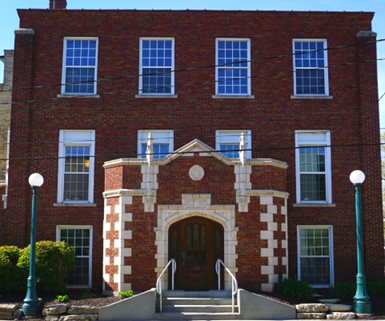Steve VanderVeen: How Ver Plank's children took over his innovative business
Peter Ver Plank was a successful innovator in the casket industry. First, he changed the casket’s hardware, then the casket itself, then its hardware again — and then, perhaps most importantly, the production processes that made them.
More:Steve VanderVeen: Peter Ver Plank changed the casket industry
In 1929, 1932 and 1935, Ver Plank expanded his factory. The additions to the south were for stamping metal parts; the addition to the west was for electro-plating. In 1933, Ver Plank added an impressive display room with a chapel-like entrance for funeral directors and casket distributors to view his products. He called the casket selling portion of his business the Royal Casket Company.
Business remained strong during the 1930s, while many others failed. Ver Plank invested his wealth in residential real estate in Zeeland, buying homes from the bank when others couldn't make their mortgage payments. He didn't take advantage of people; many years later, his grandson, Joel, learned from recipients that Ver Plank didn't charge rent.

Early on, Ver Plank banked with Zeeland State Bank. Then he moved to its rival, the State Commercial and Savings Bank, on the opposite end of downtown. Then, in the midst of the Great Depression, after Zeeland State Bank purchased State Commercial in 1937, Ver Plank became director of the First State Bank of Holland — until it merged with the Holland City State Bank and became Holland State Bank.
Before World War II, Royal Casket employed 50 people. During the war, when metal became scarce due to government rationing for the war effort, Royal Casket switched to wood production. To “hedge” against a shortage of materials, Ver Plank purchased a 300-acre farm on the southeast side of Borculo, which he called Maple Lane — thinking it would be easier for farmers than ordinary citizens or companies in nonessential industries to get ration stamps.
To make his farm fully operational, he rented the land to local farmers. This diversification helped him economically when Royal Casket couldn't obtain steel and lead. After the war, the company’s payroll grew by 50 more.
Although Peter wasn't a member of any church, he was spiritual. His grandson remembers visiting the farm on Sundays with his sister. There, they would find Peter singing old hymns and stopping all activity so he could listen to a religious radio broadcast from Chicago.

In 1943, his wife, Abbie, died — but Peter retained the services of his housekeeper.
In 1946, VerPlank sold Royal Casket to his four sons — Frank, Joseph, Marvin and Robert — and began to spend more time on the farm. He died in 1959.
At the time of his death, Ver Plank was director at the First National Bank of Holland and a respected member of the Free Masons and Shriners. In his will, he gave almost half of his estate to his sister, who was struggling financially, and almost half of his estate to his housekeeper. The farm, he gave to his children.
In 1972, Ver Plank’s grandsons — Jim and Joel — bought Royal Casket. Jim focused on sales, Joel on manufacturing. Over the years, Jim and Joel developed many strong relationships. But due to environmental concerns and pollution standards, they had to discontinue the practice of electro-plating lead decorative fixtures.
In 1982, Royal Casket Company merged with Furniture City Casket Company of Grand Rapids, which later became part of Lakeshore Consolidated, then Anedco, and then Service Corporation. When the relationship with Furniture City soured, Joel went to work as a manufacturer’s representative for other casket companies.
Subscribe:Get all your breaking news and unlimited access to our local coverage
While he was traveling near Iron City, Tennessee, an acquaintance invited Joel to look at an abandoned factory and offered to sell it to him at a very low price if Joel would start manufacturing caskets there.
In 1988, Joel purchased the facility and gradually converted it into a complete casket-making operation. In 1994, Betsy Ver Plank Kerl — Peter’s great-granddaughter and Joel’s daughter — joined the company, Ver Plank Enterprises, and became president in 2012.
Information for the last two articles comes from coffinworks.org, northwoodscasket.com, verplank.com, The Zeeland Record and an interviews with Jim and Joel Ver Plank.
— Community Columnist Steve VanderVeen is a resident of Holland. Contact him through start-upacademeinc.com.
This article originally appeared on The Holland Sentinel: Holland History: How Ver Plank's children took over his innovative business

